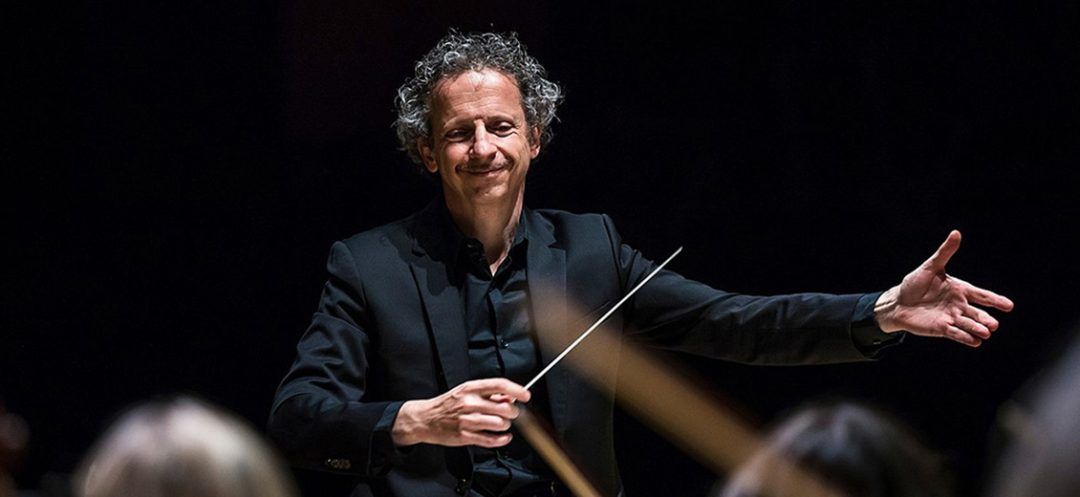
By sharing his expertise with six aspiring Lebanese conductors, Michaël Cousteau has inspired new hope through art and culture, the ultimate bulwark against rampant obscurantism.
With pervasive energy, a broad but restrained gesture, and a natural direction, Michaël Cousteau leaves the listener breathless. Serving the score with common sense and wisdom, the French conductor manages to maintain a palpable level of tension throughout the two works he conducts on July 15 at Saint Maron Church in Gemmayzeh: the Larghetto from Edward Elgar's (1857-1934) Serenade for Strings in E Minor, Op. 20, and Unfinished Journey for violin and string orchestra by Bechara el-Khoury. With years of expertise, he pays particular attention to the structure of phrasing, the blending of timbres and colors, and above all, the symbiotic interaction between the performers. After traveling the world, this pedagogue has anchored in the Land of the Cedars to share his advice and expertise with six aspiring Lebanese conductors. This musical evening brilliantly concluded the masterclass organized by Beit Tabaris, an artist residence in the heart of Beirut, highlighting both the students and the French master after an intense week of work.
Musical Effervescence
Despite the soothing summer atmosphere, the Lebanese public generously responded to the invitation. "You are proof that Lebanon will survive ignorance, decadence, and corruption," exclaimed one of the spectators to Zeina Saleh Kayali. Founder of Beit Tabaris and instigator of this musical effervescence, she has now set the bar high. In less than a month, she welcomed four renowned artists to her musical residence, each offering free masterclasses in composition, piano, saxophone, and conducting. "The joy of the young musicians participating in the masterclasses and the stars in their eyes are an extraordinary balm in these times of anxiety and uncertainty," she says emotionally to This Is Beirut. She also emphasizes that the current chaos should encourage the Lebanese to seek refuge in art. "The young conductors who found themselves conducting an orchestra, Les Cordes résonnantes, in a packed church within a week couldn’t believe it!" she recounts, before concluding: "I think this project gives them hope."
Communicative Passion
Renowned for his erudite direction of both symphonic and lyrical repertoire, Michaël Cousteau brings out all the subtleties of the score, offering interpretations with great narrative clarity. He sculpts his melodies while elevating the intrinsic harmony with a communicative passion. "Conducting must above all be grounded in reality," Michaël Cousteau says in an interview with This Is Beirut. "Far beyond audience satisfaction, the greatest reward for a conductor lies in the feeling of having fully served the musical work. Then comes the satisfaction of complicity with the orchestra and the exchange with the musicians. This inevitably involves the thread the conductor weaves between his hands and the orchestra’s sound." According to him, a conductor should play the orchestra like a pianist plays the piano. "He must influence the sonic result," insists the pedagogue, who notes that although there have been generations of empirically trained conductors, the art of conducting requires learning. "There are even different schools of conducting," he adds.
Familiar Territory
Furthermore, conducting an orchestra and a choir are two distinct practices, each with its specificities and not to be confused. Why? "Orchestra conducting imposes constraints that are entirely different from those of choir conducting," he explains. "In choir conducting, you deal with a homogeneous material – voices, while in orchestra conducting, the material is heterogeneous. The demands imposed by an orchestral score are much more complex than those of a choral score. It is therefore a different skill set." He continues: "A choir conductor is not systematically an orchestra conductor." Having conducted various orchestras in Europe, Russia, Asia, and South America, Michaël Cousteau reflects on his relationship with the Land of the Cedars: "Between 2014 and 2016, I was invited to conduct the Lebanese Philharmonic Orchestra. It was somewhat familiar territory. The Lebanese musicians were partly trained in the East but were ultimately Mediterranean, a group I am accustomed to working with. Additionally, I found several musicians from the East whom I already knew in this orchestra. This experience was not at all disorienting."
A cellist by training, the French musician notes that although Lebanon is a Levantine country, it is strongly influenced by Western culture. He acknowledges that there was "work to be done with the Lebanese Philharmonic Orchestra," but "no more than anywhere else." Michaël Cousteau remains "optimistic," observing that despite the various crises shaking Lebanon, culture retains a prominent place. "I wonder if, in France, in such a difficult economic situation, as much importance would be given to culture and art as in Lebanon," he humorously remarks before concluding: "Despite the fact that the Lebanese state barely exists, concerts are not rare. I have often been told that art could save Lebanon, and I am convinced of it."
Read more




Comments